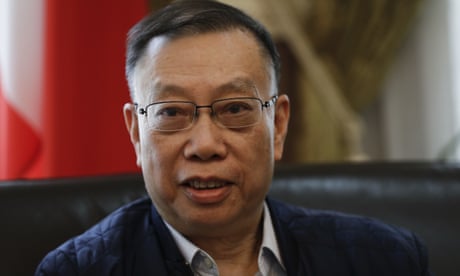By Melissa Davey
A world-first study has called for the mass retraction of more than 400 scientific papers on organ transplantation, amid fears the organs were obtained unethically from Chinese prisoners.
The Australian-led study exposes a mass failure of English language medical journals to comply with international ethical standards in place to ensure organ donors provide consent for transplantation.
The study was published on Wednesday in the medical journal BMJ Open.
Its author, the professor of clinical ethics Wendy Rogers, said journals, researchers and clinicians who used the research were complicit in “barbaric” methods of organ procurement.

Medical journal to retract paper after concerns organs came from executed prisoners.
“There’s no real pressure from research leaders on China to be more transparent,” Rogers, from Macquarie University in Sydney, said.

Medical journal to retract paper after concerns organs came from executed prisoners.
“There’s no real pressure from research leaders on China to be more transparent,” Rogers, from Macquarie University in Sydney, said.
“Everyone seems to say, ‘It’s not our job’. The world’s silence on this barbaric issue must stop.”
A report published in 2016 found a large discrepancy between official transplant figures from the Chinese government and the number of transplants reported by hospitals.
A report published in 2016 found a large discrepancy between official transplant figures from the Chinese government and the number of transplants reported by hospitals.
While the government says 10,000 transplants occur each year, hospital data shows between 60,000 to 100,000 organs are transplanted each year.
The report provides evidence that this gap is being made up by executed prisoners of conscience.
In 2017 the European parliament passed a declaration condemning organ harvesting from prisoners of conscience, and called on Chinese officials to end it.
Rogers and her team obtained all research papers reporting on Chinese transplant recipients published in English-language medical journals between January 2000 and April 2017.
In 2017 the European parliament passed a declaration condemning organ harvesting from prisoners of conscience, and called on Chinese officials to end it.
Rogers and her team obtained all research papers reporting on Chinese transplant recipients published in English-language medical journals between January 2000 and April 2017.
The 445 studies they identified involved 85,477 transplants.
But 99% of those studies failed to report whether organ donors had given consent for transplantation.
The 19 studies which claimed no organs from executed prisoners were used took place prior to 2010, when there was no volunteer donor program in China.
It is the first time a study has tracked the progress of the transplant community in blocking unethical research.
In 2017 the prestigious medical journal Liver International was forced to retract a scientific paper by Chinese surgeons who examined the outcomes of 564 liver transplantations over four years.
It is the first time a study has tracked the progress of the transplant community in blocking unethical research.
In 2017 the prestigious medical journal Liver International was forced to retract a scientific paper by Chinese surgeons who examined the outcomes of 564 liver transplantations over four years.
But experts pointed out that it was impossible for one hospital to have obtained so many useable livers given the small numbers of volunteer donors in China at the time, especially given most livers came from donors after cardiac death, or “donation after circulatory death (DCD) donors”.
Livers from these patients are only viable for transplantation in about one third of cases, meaning the numbers of livers obtained in the study did not stack up with the number of deceased patients in China.
Rogers’s research found even the Journal of American Transplantation and the official journal of the The Transplantation Society [TTS], which have policies barring unethical research involving executed prisoners, had published questionable papers.
Rogers’s research found even the Journal of American Transplantation and the official journal of the The Transplantation Society [TTS], which have policies barring unethical research involving executed prisoners, had published questionable papers.
This was despite the TTS in 2016 declaring it would not accept papers where organs had been sourced from prisoners.

China is still using executed prisoners' organs, official admits.
The paper concludes: “The transplant community has failed to implement ethical standards banning publication of research using material from executed prisoners.
“As a result, a large body of unethical published research now exists, raising questions of complicity to the extent that the transplant community uses and benefits from the results of this research.
“We call for immediate retraction of all papers reporting research based on use of organs from executed prisoners, and an international summit to develop future policy for handling Chinese transplant research.”
Guardian Australia has contacted the International Committee of Medical Journal Editors for comment.
“It’s not good enough to just have ethical guidelines without implementing them,” Rogers said.
While China vowed to stop using organs from executed prisoners in 2015, no new law or regulation has been passed banning the practice.

China is still using executed prisoners' organs, official admits.
The paper concludes: “The transplant community has failed to implement ethical standards banning publication of research using material from executed prisoners.
“As a result, a large body of unethical published research now exists, raising questions of complicity to the extent that the transplant community uses and benefits from the results of this research.
“We call for immediate retraction of all papers reporting research based on use of organs from executed prisoners, and an international summit to develop future policy for handling Chinese transplant research.”
Guardian Australia has contacted the International Committee of Medical Journal Editors for comment.
“It’s not good enough to just have ethical guidelines without implementing them,” Rogers said.
While China vowed to stop using organs from executed prisoners in 2015, no new law or regulation has been passed banning the practice.
Humanitarian groups including Amnesty International have voiced concerns that the practice is continuing.
In December, the Independent Tribunal into Forced Organ Harvesting from Prisoners of Conscience in China issued its interim report, finding: “The tribunal’s members are all certain – unanimously, and sure beyond reasonable doubt – that in China forced organ harvesting from prisoners of conscience has been practised for a substantial period of time involving a very substantial number of victims.”
The tribunal’s full report is due in 2019.
In December, the Independent Tribunal into Forced Organ Harvesting from Prisoners of Conscience in China issued its interim report, finding: “The tribunal’s members are all certain – unanimously, and sure beyond reasonable doubt – that in China forced organ harvesting from prisoners of conscience has been practised for a substantial period of time involving a very substantial number of victims.”
The tribunal’s full report is due in 2019.
 A world-first study says journals, researchers and clinicians who used the research on organ transplantation were complicit in ‘barbaric’ methods of organ procurement.
A world-first study says journals, researchers and clinicians who used the research on organ transplantation were complicit in ‘barbaric’ methods of organ procurement.
Aucun commentaire:
Enregistrer un commentaire